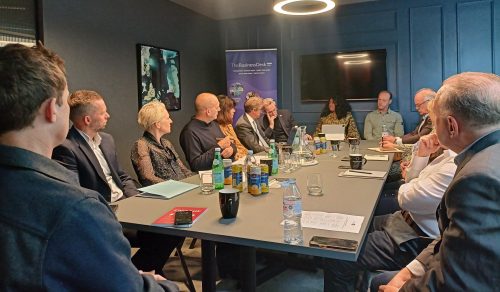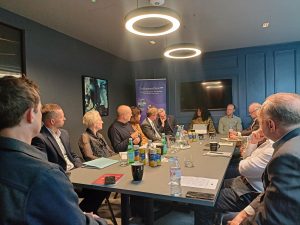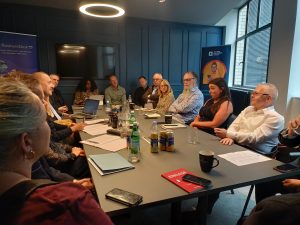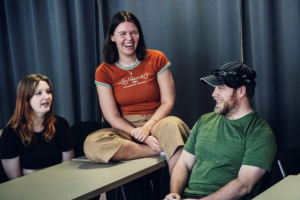Fostering meaningful engagement in the workplace


The discussion focused on strategies for employee engagement and retention, including the importance of flexible work arrangements, trust, and mental health support.
Phil Wedgwood, the CEO and co-founder of Engage, set the tone by explaining the company’s focus on creating “thriving communities” for both internal and external audiences. He emphasized Engage’s expertise in combining “non-tech know-how” on engagement with the latest technological solutions to help businesses connect with their people in “a modern and fresh way.” But insisted he wanted to hear different perspectives from the participants.
Nadine Watson, a senior lecturer in Human Resource Management at the University of Salford, provided an academic perspective on the current workplace trends. She noted a “mixed picture” in the post-COVID landscape, with some employees feeling apathetic about returning to the office, while others craved the in-person interaction. Nadine highlighted the “intersection between AI and employee relations” and the potential damage to the “psychological contract” when organizations demand a return to the physical workplace.
“There’s definitely digital enhanced engagement opportunities, and there needs to be buy-in from organizations and buy-in from the most senior people in, across the board, in organizations,” Nadine said.
James Brown, the co-owner of Hall Brown Family Law, shared how his firm has been recognized as one of the top 10 companies to work for in the UK. He attributed this success to the firm’s focus on purpose and culture, rather than just offering competitive benefits, but recognised her was at an advantage as a law firm.
“I think what we think there’s a difference between package and engagement,” James explained.

“It’s about giving people something that they value to say, so I can say to those people, well, you’re not a name on a spreadsheet. You’re an individual human being. We really respect you. We know that you’re going through challenges,” Chris shared.
Ian MacArthur, the director of the Greater Manchester Good Employment Charter, discussed how the charter has evolved to address the challenges posed by the COVID-19 pandemic. He highlighted the charter’s focus on engagement and voice, emphasizing the importance of technology in facilitating two-way communication between employers and employees.
“We look at, definitely, other mechanisms for engagement and voice and through the covid period, particularly, we did start to look at Tech, and we do pulse surveys, using a dashboard, all that stuff that you would expect, and that has really cottoned on. In some of our communities it’s a mechanism by which the messaging can go both ways,” Ian said.
Elizabeth Cameron, an equality, diversity, and inclusion consultant and the D&I Lead at the Chartered Management Institute West Midlands & North West regional board, raised the critical issue of addressing the needs of diverse employee groups, including women, people of colour, and those with disabilities. She emphasized the importance of creating an inclusive environment and the role of leadership in fostering a culture of respect and support.
“I think that we need to think about all of this agenda in terms of meeting the needs of LGBTQ disabled people, especially in neurodiversity. I mean, I have a daughter on the spectrum, so I relate, but it’s almost a different conditioning. And I if we examine what young people will be prepared for in terms of their offer back into businesses. They’re not being prepared for what lies further down the road,” Elizabeth said.
Kate Wood from AMS spoke about building a culture at a fast growing professional services firm, “We have an academy, the AMS Academy, where we recruit a lot of young people and have this week taken on six new apprentices. For them when you’re young and you’re learning and you’re in the academy, it is best to be in the office. You learn so much from being around other people. So we have that cohort in the office, but also we are flexible for them to work from home as time goes on, but for the majority of our audit and accountancy practice people, they would work in the office, and we get a really high turnout of people wanting to come in the office.”
Johnathan Massey at the BGF presides over a portfolio of disparate companies in a wide range of sectors. He says the most valuable aspect of engagement is authenticity; doing it like you mean it.
“Fundamentally, if you’re retaining people, hiring people, some common factors cut across that, and trust is a big one. Sometimes get younger businesses thinking gimmicks are the answer in to attractive and retain people. Quite often, they’re not the solution. Ultimately, people want to feel valued and listened to. I think that’s the critical bit.
“We certainly encourage all of our portfolio companies to go down that route, whether it’s technology enablement, or a people resource or whatever it is, to get that part of the business working well. It’s difficult as you scale, because cultures change.”
Consultant Anne-Marie O’Neill shared some horrific examples of tokenism and bad management practices.
“The situations I come into are quite often everyone hates each other, and the job can sometimes be to make everyone happier as a group and like each other and like me less slightly,” she said.
She said she has worked with organisations where they say all the right things and they will listen, but their intent is nowhere near and that really makes her angry.
She spoke of the agency that “rounded up“ its black members of the team to front campaigns at the height of BLM, and another where she was invited in to prepare a board report a year in advance when she could say with confidence: “I don’t need a year, I can tell you 10 things you could change today.”
She added: “I’ve worked at organizations where they wouldn’t even give people sick pay, and I had to fight to get them sick pay in a tech firm, and they had another side of them, at the manufacturing and the warehouse side, where we weren’t allowed to publicise the stuff the tech people did because the warehouse staff might get jealous, and it was like, a fruit basket.”
Her conclusion: “You’ve got to be committed to actually wanting to do it, rather than just saying it.”
Carolyn Hicks, partner at Grant Thornton said: “On the point about flexibility and agility. A lot of it is about individual control. We should collectively stop talking about office versus home. It’s about what is the work, where’s the right place to do it? Do I have control over the fact that I could rock up into the office at 10am or I could start at 7am and finish at eight or five, or whatever is going to work for me in my life, and it’s different.
“I also totally get the point when you’re training a new cohort, we need to put much stronger guardrails around that.”
Carol Spiller, senior partner of law firm Weightmans reflected on the great resignation and the learnings after the pandemic.
“So even before covid happened, we were actually agile, so we were probably a little bit ahead of the curve at that stage.
“I’m fascinated about technology and what is available to connect with the younger generation and the more tech savvy generation. So we’ve probably got more generations in the workplace now than we’ve ever had before. But you have to find something that works for everyone. It’s not going to be a one size fits all. So we’ve spent a lot of time listening to people. We do 360 surveys where you get people to comment what they like and don’t like about the business, to find out what works for them, and then it is really up to us to communicate properly and support people.
Donald Moore, chairman of One + All, said it’s important to meet people where they are, listen to their stories, but above all else, be kind.
“If you get to the point where people can tell you stuff in confidence, and they know that you’ll help in all sorts of ways, that’s good.
“Some people just haven’t got that basic skill of budgeting because they’re never taught at school, and they’re just like, muddled through. And when you get that, which is a bit emotional, I think that’s what I’m more proud of. The profits are like miles higher than ever, but happiness is miles higher too. But when you see people that have got a smile on a Monday morning and they’re going through some really difficult parts of a hard job. I think that’s what it’s all about.
“So I think it’s all about trust and care from all sides. That’s the way to get, like, world class customer satisfaction, I think, generally, if in doubt, you’ve just got to be kind.”
Simon Wharton, from tech business PushOn said he had honed his leadership style from his past experiences: “I worked at IBM for three years and it was a terrible experience. They talked the talk and did not deliver. And I never wanted to work with that kind of company again. And then I worked for a tech company which had possibly four of the most evil people, I’ve ever met. Some of the directors, I believe, met in prison. So when myself and my co founder, Roy, set up a business where we did not want to be like those people. The kind of business that we are was really, really important to us. And we’ve always tried to when we say this and we mean this, there is a no kind of closed door policy. You can talk to us about anything, which has benefited as well. But the one thing that we’ve actually discussed is some employees are assholes. You have bad actors within the business, so we focus on good recruitment. Are you as an employee going to actually walk the walk?”
David Bowcock, office managing partner of law firm fieldfisher said it was important to listen to what is important to people: “I ask as many people what’s bothering them and what will help launch them, and what will motivate them. In the course of a day I will get a selection of good faith, genuine answers where people are really worried about the fourth line of the costs in the management accounts, and how can they help the firm to be more profitable? Somebody else will tell me that the cornstarch recyclable spoons in the kitchen always break when they’re eating their soup. And I have to address all of those issues in the same way, with the same commitment to try to go back to people with something that shows we’re trying to make it better. But I think as leaders, it falls to us to be flexible and respond to that bizarre, at times, range of needs, rather than just slapping in one solution.”










